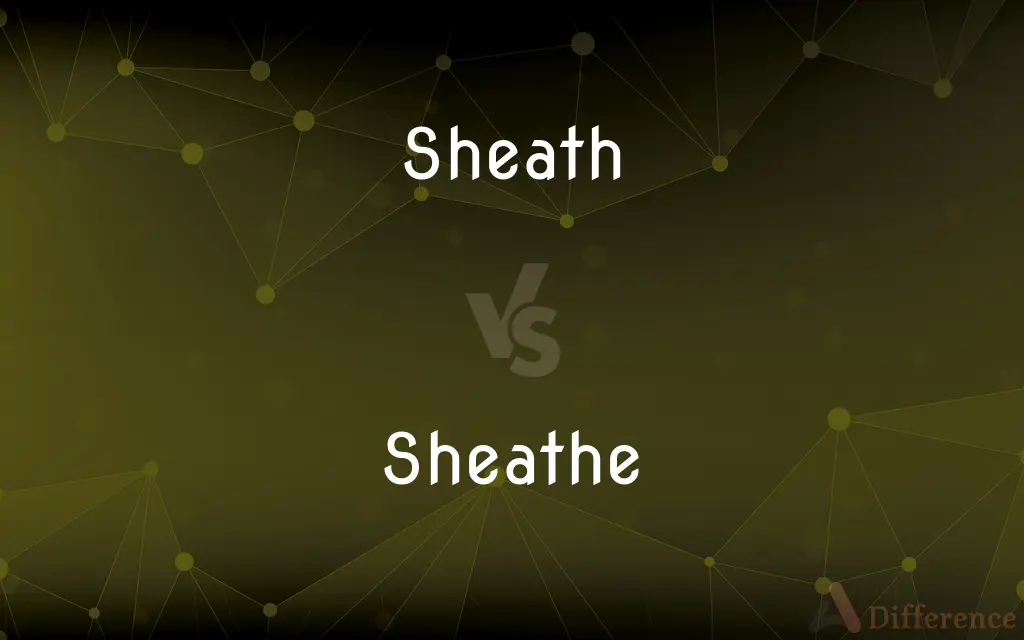Sheath vs. Sheathe — What's the Difference?
Edited by Tayyaba Rehman — By Fiza Rafique — Updated on October 25, 2023
Sheath is a noun referring to a protective covering, while Sheathe is a verb meaning to cover or enclose in such a covering. Both relate to protection but differ in grammatical function.

Difference Between Sheath and Sheathe
Table of Contents
ADVERTISEMENT
Key Differences
Sheath and Sheathe are words that revolve around the idea of protection or enclosure, albeit they have distinct grammatical roles. Sheath serves as a noun and represents a protective covering, often for a knife, sword, or another elongated object. You might hear of a sword being pulled from its sheath, indicating the protective casing from which the sword is drawn.
Sheathe, on the other hand, functions as a verb. It signifies the act of placing something into a sheath or covering it with a protective layer. For instance, one might sheathe their sword after a duel, meaning they are placing the sword back into its protective covering.
Sheath can also be used in broader contexts, such as biology, where it may refer to a protective layer around a plant or animal organ. Contrarily, Sheathe maintains its role as an action and could be used in diverse settings, like construction, implying to cover or encase something with a protective material.
In summary, while both words are closely connected in meaning, Sheath is the protective covering itself, and Sheathe is the act of using or placing something into that protective covering.
Comparison Chart
Grammatical Function
Noun
Verb
ADVERTISEMENT
Primary Meaning
A protective covering.
To cover or enclose in a protective layer.
Example Usage
Swords, knives, biological coverings.
Actions related to placing or covering.
Related Terms
Scabbard, casing, envelope.
Encase, cover, protect.
Associated Actions
Storing, protecting, covering.
Inserting, encasing, covering.
Compare with Definitions
Sheath
A structure in anatomy that encloses muscles or nerves.
The carpal tunnel is a sheath in the wrist.
Sheathe
To cover or enclose with a material.
The architect decided to sheathe the building in copper.
Sheath
A protective case for a blade.
He drew the knife from its sheath.
Sheathe
To wrap or envelop.
The artist chose to sheathe the statue in a velvet cloth.
Sheath
An insulating cover around a wire.
Ensure the sheath around the wire is intact.
Sheathe
To insulate by applying a protective layer.
Electricians need to sheathe wires to prevent accidents.
Sheath
A protective covering on a plant or animal.
The leaf's sheath protects its delicate inner parts.
Sheathe
To encase for protection.
Always sheathe your tools when not in use.
Sheath
A close-fitting cover for the blade of a knife or sword.
Sheathe
Put (a weapon such as a knife or sword) into a sheath
I sheathed my dagger
When lion cubs strike out at one another, they keep their claws sheathed
Sheath
A usually close-fitting case or covering for a blade, as of a sword.
Sheathe
Encase (something) in a close-fitting or protective covering
Her legs were sheathed in black stockings
Sheath
Any of various similar coverings.
Sheathe
To insert into or provide with a sheath.
Sheath
(Biology) An enveloping tubular structure, such as the base of a grass leaf that surrounds the stem or the tissue that encloses a muscle or nerve fiber.
Sheathe
To retract (a claw) into a sheath.
Sheath
A close-fitting dress.
Sheathe
To enclose with a protective covering; encase.
Sheath
A condom.
Sheathe
(transitive) To put (something such as a knife or sword) into a sheath.
Sheath
A holster for a sword; a scabbard.
Sheathe
(transitive) To encase (something) with a protective covering.
Sheath
(by extension) Anything that has a similar shape to a scabbard that is used to hold an object that is longer than it is wide.
Sheathe
(transitive) Of an animal: to draw back or retract (a body part) into the body, such as claws into a paw.
Sheath
(botany) The base of a leaf when sheathing or investing a branch or stem, as in grasses.
Sheathe
To thrust (a sharp object like a sword, a claw, or a tusk) into something.
Sheath
(electrical engineering) The insulating outer cover of an electrical cable.
Sheathe
To abandon or cease (animosity, etc.)
Sheath
(entomology) One of the elytra of an insect.
Sheathe
To provide (a sword, etc.) with a sheath.
Sheath
(fashion) A tight-fitting dress.
Sheathe
To relieve the harsh or painful effect of (a drug, a poison, etc.).
Sheath
(zoology) The foreskin of certain animals (for example, dogs and horses).
Sheathe
To put into a sheath, case, or scabbard; to inclose or cover with, or as with, a sheath or case.
The leopard . . . keeps the claws of his fore feet turned up from the ground, and sheathed in the skin of his toes.
'T is in my breast she sheathes her dagger now.
Sheath
A condom.
Sheathe
To fit or furnish, as with a sheath.
Sheath
Alternative spelling of sheathe
Sheathe
To case or cover with something which protects, as thin boards, sheets of metal, and the like; as, to sheathe a ship with copper.
Sheath
A case for the reception of a sword, hunting knife, or other long and slender instrument; a scabbard.
The dead knight's sword out of his sheath he drew.
Sheathe
To obtund or blunt, as acrimonious substances, or sharp particles.
Sheath
Any sheathlike covering, organ, or part.
Sheathe
Cover with a protective sheathing;
Sheathe her face
Sheath
A protective covering for a knife or sword
Sheathe
Enclose with a sheath;
Sheathe a sword
Sheath
An enveloping structure or covering enclosing an animal or plant organ or part
Sheathe
Plunge or bury (a knife or sword) in flesh
Sheath
A dress suitable for formal occasions
Sheathe
To put into a protective casing.
He took a moment to sheathe his sword.
Common Curiosities
What is the primary function of Sheath?
Sheath is a noun referring to a protective covering.
How is Sheathe typically used in a sentence?
Sheathe is used as a verb meaning to cover or encase in a protective layer.
Is Sheathe ever used in construction?
Yes, in construction, "sheathe" can mean to cover a structure with a specific material.
Which word refers to the action and which to the object?
Sheathe refers to the action, while Sheath refers to the object or covering.
Can both words be used in the context of tools?
Yes, tools can be stored in a sheath, and one can sheathe a tool in its case.
Can you use Sheath for electrical contexts?
Yes, a Sheath can refer to the insulating cover around a wire.
Can Sheath refer to clothing?
Yes, a sheath can also mean a close-fitting dress.
Can Sheath have biological references?
Yes, Sheath can refer to protective layers in plants or animals.
What might you sheathe a building in?
You might sheathe a building in materials like wood, metal, or stone for aesthetics or protection.
Does Sheathe always involve physical objects?
Typically, yes, but it can also metaphorically mean to envelop or wrap something.
What's the opposite of Sheathe?
The opposite action of "sheathe" could be "unsheathe" or "draw."
Can Sheath be used in anatomy?
Yes, Sheath can refer to structures that enclose muscles or nerves.
Does Sheathe always relate to protection?
While protection is a common theme, Sheathe can also imply mere covering or wrapping.
Is a scabbard similar to a Sheath?
Yes, a scabbard is a type of sheath specifically for a sword.
How do the words relate in terms of meaning?
Sheath is the protective covering, while Sheathe is the act of using or placing something into that covering.
Share Your Discovery

Previous Comparison
Panjabi vs. Punjabi
Next Comparison
Analysis vs. AnalysesAuthor Spotlight
Written by
Fiza RafiqueFiza Rafique is a skilled content writer at AskDifference.com, where she meticulously refines and enhances written pieces. Drawing from her vast editorial expertise, Fiza ensures clarity, accuracy, and precision in every article. Passionate about language, she continually seeks to elevate the quality of content for readers worldwide.
Edited by
Tayyaba RehmanTayyaba Rehman is a distinguished writer, currently serving as a primary contributor to askdifference.com. As a researcher in semantics and etymology, Tayyaba's passion for the complexity of languages and their distinctions has found a perfect home on the platform. Tayyaba delves into the intricacies of language, distinguishing between commonly confused words and phrases, thereby providing clarity for readers worldwide.














































